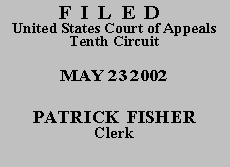

| RICHARD POUNDS, Paralegal,
in propria persona, libera lex, sui juris,
federal witness, private attorney
general,
Plaintiff - Appellant, v. DEE KILLION, a/k/a Dee Childers, Defendant - Appellee. |
|
Plaintiff-appellant Richard Pounds appeals the district court's order granting summary judgment to defendant Dee Killion, an Indian Child Welfare Worker for the Eastern Shawnee Tribe of Oklahoma (the Tribe), on his claims brought against her under 42 U.S.C. § 1981 and § 1983. After de novo review, we affirm.
In early 1996 defendant met with Rebecca McRae, Rebecca's mother, Mary Pounds, and Rebecca's grandmother to discuss the welfare of Rebecca McRae's three children. As a result of this meeting, Rebecca McRae assigned custody of her children to the Tribe. Defendant placed the children with Rebecca's mother, Mary Pounds. Plaintiff was, at that time, Mary Pounds' live-in boyfriend with no biological or legal relationship to the three children. Plaintiff and Mary Pounds have since married.
The district court has recited the numerous court orders and hearings that have preceded this case in tribal, state, and federal courts. We will not repeat those here. The upshot is that Mary Pounds' grandchildren have now been adopted by another family. Plaintiff asserts that defendant's role in this matter was tortious under various state law theories and that she violated his constitutional rights to equal protection, due process, and access to the courts.
The district court granted summary judgment to defendant on the § 1983 claim, holding that she enjoyed tribal sovereign immunity and, alternatively, that plaintiff had failed to establish action by defendant under color of state or federal law. As to the § 1981 claim, the court found no evidence of a contract, of an employment relationship stemming from a contract, or of the existence of racial animus which would permit application of § 1981.
Plaintiff's complaint states that defendant was employed by the Eastern Shawnee Tribal Business Council as the Tribe's Indian Child Welfare Worker and that she was an officer of the Court of Indian Offenses Children's Division. He further states that defendant is an "Officer of the Court acting within her official capacity under color of legal authority." R. Vol. I, tab 3 at III.
To the extent this allegation states a claim against defendant in her official capacity, it is barred by tribal sovereign immunity. See E.F.W. v. St. Stephen's Indian High Sch., 264 F.3d 1297, 1302, 1305 (10th Cir. 2001) (holding that employees of tribal social services agency enjoyed sovereign immunity from mother's civil rights claims stemming from removal of daughter from her custody and placement in psychological care facility despite existence of agreement with State of Wyoming to provide social services to reservation children).
Alternatively, and to the extent these claims are brought against defendant individually, plaintiff has failed to establish any tie to state law for purposes of 42 U.S.C. § 1983. Plaintiff alleges in his complaint that defendant was "acting within her official capacity under color of legal authority." This allegation, however, is insufficient to bring plaintiff's claims under the ambit of § 1983 which requires a putative defendant to act "under color of state law." See 42 U.S.C. § 1983. "Indian tribes are not states of the union within the meaning of the Constitution, and the constitutional limitations on states do not apply to tribes." Chapoose v. Hodel, 831 F.2d 931, 934 (10th Cir. 1987) (quotation omitted). Because plaintiff does not allege that defendant acted under color of state law, the district court was correct to grant summary judgment to defendant on that basis. See E.F.W., 264 F.3d at 1305-06.
Finally, the district court also correctly determined that summary judgment for defendant was proper on plaintiff's claim brought under 42 U.S.C. § 1981.
The judgment of the United States District Court for the Eastern District of Oklahomais AFFIRMED. The mandate shall issue forthwith.
Entered for the Court
Circuit Judge
*. This order and judgment is not binding precedent, except under the doctrines of law of the case, res judicata, and collateral estoppel. The court generally disfavors the citation of orders and judgments; nevertheless, an order and judgment may be cited under the terms and conditions of 10th Cir. R. 36.3.